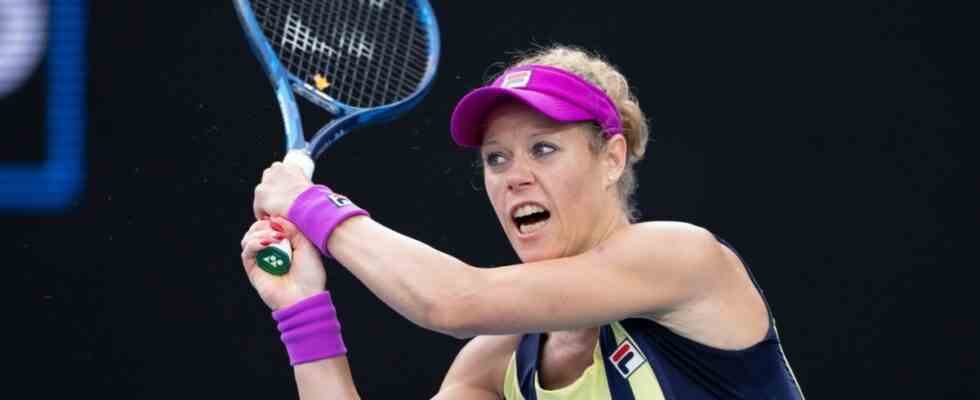The seagulls circled, the sky glowed crimson when Laura Siegemund and Caroline Garcia had finished their break and went back onto the pitch. It was 4: 3 in the third set for the French. The crowd cheered and roared at the Kia Arena, this mid-sized stadium that was inaugurated last year and is ideal for point-to-point matches. The cauldron-like makes calls and songs appear even more urgent. In one of the rows sat a young man, he’d been wearing a rubber horse’s head for most of that Saturday night, the people of Melbourne are sometimes fascinating creatures. But now the man had put down the horse’s head. He stared at the field, and that was only too understandable: everything down there was at stake now. You had to look closely.
The fact that this third round game, which ended 1:6, 6:3, 6:3 in Garcia’s favour, was tight was mainly due to the fact that Siegemund, 34, had come up with a clear match plan. “I implemented exactly what we had planned,” she said, meaning her team with the plural. So she wanted to try to “hurt Garcia early on in the points”, which she initially did extremely efficiently. She boldly sought the attack without overreacting. She wanted to “serve with a quota, i.e. placed”, and she did that too.
Siegemund, who is currently number 158 in the world rankings but is known to have been in much higher regions, put Garcia, number four, under a lot of pressure. After just 34 minutes, she had taken the sentence from her favorite opponent. “Everything went in there for me, too. But she was also very overwhelmed.” Which was surprising, because the 29-year-old had won the WTA Finals at the end of last season and had also traveled to Melbourne in excellent form.
Caroline Garcia may have only reached the round of 16, but she performed a first-class jubilation dance. How is that supposed to be when the number 4 triumphs at the very end of the tournament?
(Photo: Jaimi Joy/Reuters)
In the second set, however, the game tipped over, Garcia increased the tempo for her part, the wind had died down, which helped her game as well as the fact that she had become better and better at adjusting to Siegemund’s treacherous service to the body. The Frenchwoman had also acted extremely shaky and error-prone at the beginning. “That’s the quality of such a top player,” Siegemund said.
The third set was open for a long time, Garcia started with a break, Siegemund immediately got back this loss of serve. But in the final phase, Garcia’s toughness prevailed, even if the final phase was extremely intense and Siegemund scored some spectacular points. Once, after winning a point, she just stood up and pointed her index finger in the sky, and again there was a romp and jeering. She had shown it to all the “Allez, Caro!” callers in the second.
A few emotions came up when Siegemund received a penalty because she needed more than the allowed 25 seconds between two points on serve – first a warning followed, the second time her first serve was canceled and it said: “Second serve”, second serve. She then made the point with a terrific passing ball. After all, she won the beauty award thanks to such beatings. She explained why she lost: “It wasn’t enough because of a few strategic things.”
“Of course, the record cannot be satisfactory for Germany,” says DTB President Dietloff von Arnim
Dietloff von Arnim also followed Siegemund’s game in the arena, the President of the German Tennis Association came to Melbourne for ten days, he wants to run for the post of World Association President in September and is therefore also on a promotional tour. “Her performance was outstanding, she really put her heart on the pitch,” said Arnim of the SZ and looked down at the pitch thoughtfully. “It’s a shame she lost that.”
The last DTB professional was eliminated in Siegemund. “Of course, the record cannot be satisfactory for Germany if we don’t have a single player in the second week,” Arnim summed up and admitted: “It’s a sobering performance.” He therefore also spoke a first gentle demand in the pleasant evening air of Melbourne: “We have to work through that and ask ourselves: Is this a one-off situation now, or is it a status that we have now? If that’s a permanent status, we have to we will certainly take measures to get back to more successful balance sheets. Of course we want to be better, we have a different claim in German tennis.”

